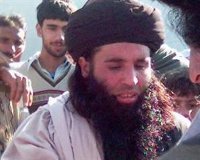|
|
|
Mullah Qari Fazlullah. |
An Afghan police commander claimed that his forces killed a top Pakistani Taliban leader during a clash in Nuristan province. The report has not been confirmed by US officials.
Mullah Qari Fazlullah, the Taliban commander of the Pakistani district of Swat, was said to have been killed during a clash last night by Afghan border police.
“Maulvi Fazlullah was killed in direct clash with Afghan border police…last night,” Mohammed Zaman Mamozai, the chief of the border police force for eastern Afghanistan told The News. Fazlullah was reported to have been killed along with six other Taliban fighters.
US military and intelligence officials contacted by The Long War Journal could not confirm or deny the reports of Fazlullah’s death.
“If the Afghan border police killed him, we should see the corpse,” a military officer serving in the region told The Long War Journal. “It shouldn’t be difficult to confirm or deny it is him.”
The Afghan Taliban confirmed that a clash occurred with Afghan security forces in Nuristan, but denied that the Pakistani Taliban were involved in the fighting. The Afghan Taliban often deny any involvement by the Pakistani Taliban in an effort to present the insurgency as a nationalist struggle against foreign occupation.
The Pakistani Taliban confirmed that Fazlullah shelters in Nuristan but denied that he would lead attacks in the area.
“He could be in Nuristan because the Taliban have been moving back and fourth along the (Pakistan-Afghan) border,” Faqir Mohammed, the leader of the Movement of the Taliban in the Bajaur tribal agency, told The News. “He may be living in Nuristan but he is not engaged in any fighting there.”
Fazlullah was reported to have led yesterday’s assault on the district center in Barg-e-Matal, one of two districts in Nuristan that border Pakistan’s Chitral region. Two Afghan policemen and seven Taliban fighters were said to have been killed in the attack. Barg-e-Matal borders the district of Kamdish, which is under Taliban control since US forces withdrew from combat outposts last fall after an attack by a large Taliban and al Qaeda force.
Background on the Pakistani Taliban operating in eastern Afghanistan
Taliban commander Qari Ziaur Rahman, who operates on both sides of the Afghan and Pakistani border, said that the US pullout from Kamdish and the Korengal Valley in neighboring Kunar province has given the Taliban greater freedom of movement on both sides of the border. Rahman is known to coordinate attacks on both sides of the border. He is closely allied with al Qaeda and is said to lead one of the six brigades of al Qaeda’s paramilitary Shadow Army, or the Lashkar al Zil.
Fazlullah’s forces are thought to have moved into Nuristan last fall to evade a Pakistani military offensive that began in May 2009 and targeted him and the leadership of the Swat Taliban. In a phone call to the media late last year, he claimed he was in Afghanistan.
Fazlullah controlled the Pakistani district of Swat for more than two years after the government signed multiple peace agreements that helped him consolidate his power. His forces have survived last year’s Pakistani military offensive and have re-infiltrated Swat to wage a low-intensity insurgency that consists of targeted assassinations of pro-government tribal leaders and politicians.
The Pakistani military has claimed it killed Fazlullah, Rahman, Faqir, and other top Taliban leaders in airstrikes and raids over the past year, but the Taliban leaders have eventually granted interviews with the media and mocked Pakistani officials.
Fazlullah is one of the more radical and eccentric Taliban leaders in the Northwest Frontier Province. He has been nicknamed “Mullah FM” and “Mullah Radio” for pioneering the use of illegal radio broadcasts to promote his radical agenda. In Swat, he has preached jihad and called for the imposition of sharia law on his illegally run radio station. He campaigned against girls’ schools and polio vaccinations. Fazlullah also conducted campaigns where he organized the burning of television sets, digital and video cameras, computers, and other electronics as they are a “source of sin.”
The 31-year-old radical cleric is leader of the local al Qaeda-linked and outlawed Tehrik-e-Nifaz-e-Shariat-e-Mohammadi (TNSM – the Movement for the Implementation of Mohammad’s Sharia Law), also referred to as “the Pakistani Taliban.” Under the command of Sufi Mohammed, Fazlullah’s father-in-law, the TNSM sent over 10,000 of its fighters into Afghanistan to fight US forces in 2001 before the fall of the Taliban.









2 Comments
Good news if true.
This confirms at least one thing that during the Swat clean up , he was ” shifted” by the ISI to friendly areas in Afghanistan.